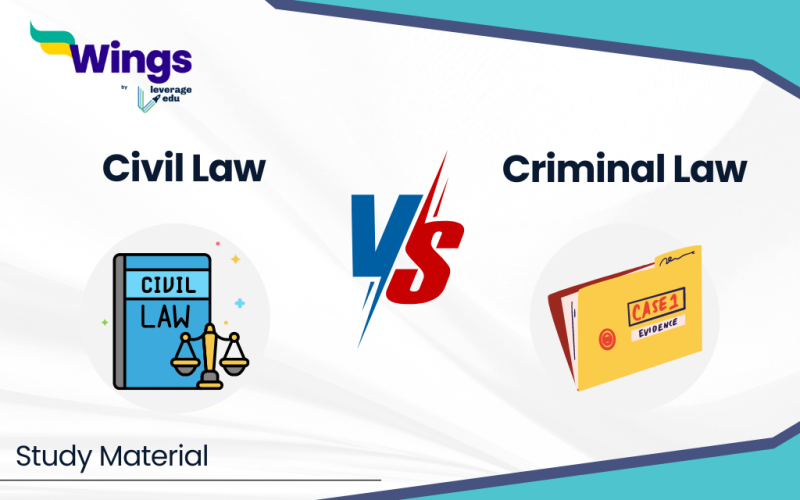Every law system in any country is based on two types of laws according to every layman’s language. These two laws are Civil and Criminal Law. The basic difference between Civil and Criminal law is that the rules and regulations in Civil law are based on the candidate’s non-criminal act such as divorce or family dispute, whereas the rules under criminal law are for any criminal act committed by anyone.
This blog will provide you with insights into Civil and Criminal and also study in-depth details on the differences between civil and criminal law.
Table of Contents
What is Civil Law?
The other term for Civil law in the country is private law. This law encompasses the different non-criminal acts committed by any party such as personal affairs, business and other organisations.
The Civil law in the country helps the citizens to solve their problems such as property disputes, affairs, marriages etc, There are mainly 6 parties involved in any civil case, such as;
- Plaintiff
- Attorneys
- Defendant
- Third parties
- Witnesses
- Judge
What is Criminal Law?
On the other hand, the criminal law in any country punishes the citizens if they have committed any criminal act. The other name of this law is Penal Law.
The main purpose of this law is to punish the criminal rather than solve the issue. Here are the first parties involved in the Criminal case:
- Prosecution
- Defendant
- Judge
- Witnesses
- Victims
Also Read: Difference Between GHz and MHz
Differences Between Civil and Criminal Law
To give you a brief idea of the difference between Civil and criminal law, here’s a table for you to understand:
| Factor | Civil Law | Criminal Law |
| Purpose | Resolving disputes between individuals or entities, | Punishing offenders for wrongful conduct, |
| Burden of Proof | Preponderance of evidence | Proof beyond a reasonable doubt. |
| Parties Involved | Private individuals, organizations, or businesses | Government (prosecution) vs. individuals accused of crimes. |
| Penalties | Monetary compensation, specific performance. | Imprisonment, fines, probation, community service, or capital punishment. |
| Legal Representation | Parties may represent themselves or hire counsel. | defendants have the right to an attorney, provided if unable to afford one. |
| Verdict | Decided by judges or juries. | Decided by judges or juries |
Also Read: What is the Difference Between Device and Machine? Complete Details
FAQ
In any country, the law states different laws and regulations based on its resident’s personal life that includes their personal life such as differences in property ownership, marriage laws etc.
The criminal law in any country makes the lives of its residents safe punishing them if there is any criminal act committed by them.
The basic difference between civil and criminal law is that civil law is for its resident’s personal affairs whereas criminal law is to punish them if there is any criminal act committed by them.
RELATED BLOGS
This was all about the “Difference Between Civil and Criminal Law”. For more such informative blogs, check out our Study Material Section, you can learn more about us by visiting our Indian exams page.
 One app for all your study abroad needs
One app for all your study abroad needs













